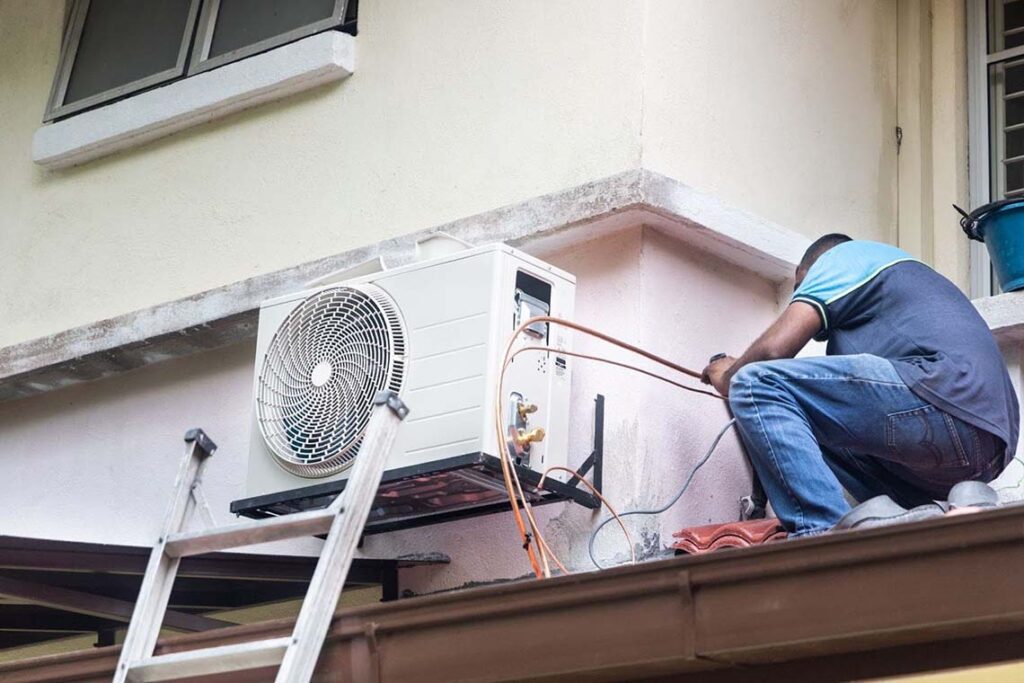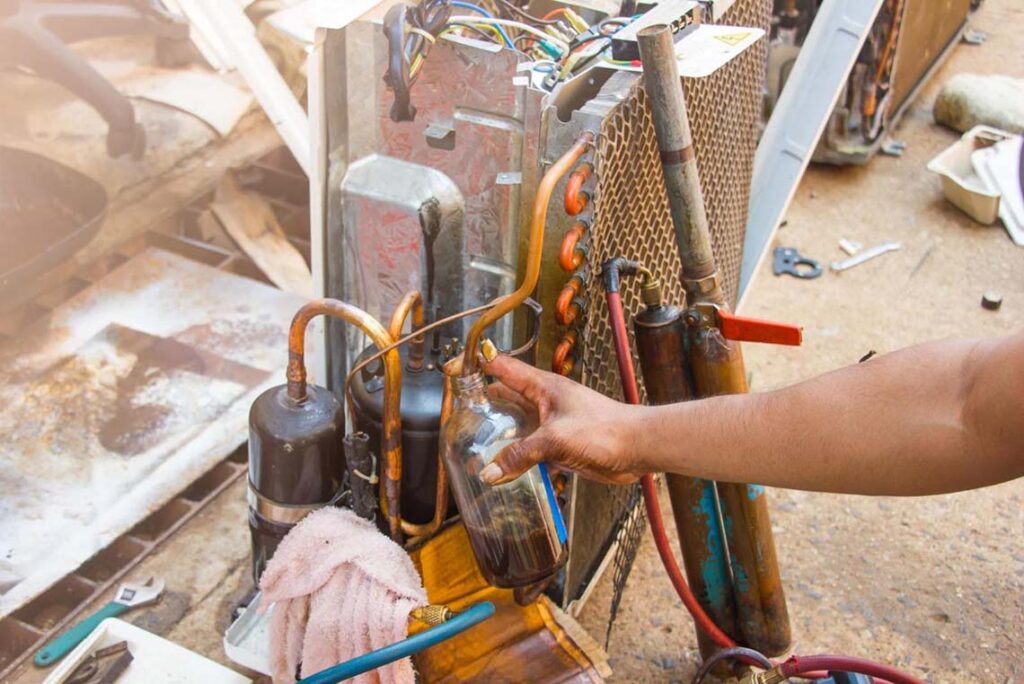
When your heater dies in winter or your AC gives out in mid-July, there’s one person you’re counting on—an HVAC technician. These technicians aren’t just handymen with tool belts. They’re trained specialists keeping homes, offices, and stores safe and comfortable year-round. From emergency repairs to scheduled maintenance, they ensure your system runs smoothly when it matters most. You rely on their work more than you probably think.
What an HVAC Technician Does
Heating, ventilation, and air conditioning systems control home and commercial buildings’ comfort and air quality. Without proper care, these systems break down, drive up bills, or stop working altogether. An HVAC technician keeps everything running—from furnaces to central AC units. Their job isn’t just about fixing things but preventing breakdowns before they happen.
Heating, Ventilation, and Air Conditioning Defined
HVAC stands for heating, ventilation, and air conditioning. These systems control indoor temperatures and airflow all year round—heating systems warm buildings during colder months, and air conditioners cool indoor air in summer. Ventilation keeps indoor air clean by pushing out stale air and bringing in fresh air.
Daily Responsibilities of an HVAC Technician
An HVAC technician performs a wide range of tasks. They install new systems, repair broken ones, and inspect older units. Diagnostics are a big part of their day—pinpointing problems before they worsen. They also handle refrigerants, test thermostats, and calibrate system controls. Every task is about keeping things safe, efficient, and reliable.
Emergency Repairs and On-Call Work
HVAC systems can fail at the worst times. That’s why many HVAC technicians offer 24/7 emergency service. Whether it’s a freezing home or a boiling office, they show up fast. They assess the problem, fix it quickly, and make sure it’s safe to use again. The job can mean long hours, especially during extreme weather seasons.
Core Skills Every HVAC Technician Must Have
HVAC technicians need more than tool knowledge. They must blend mechanical skills with sharp thinking and strong communication. The job demands physical effort and a solid grasp of safety. No two jobs are the same, and that’s what makes the work challenging and rewarding.
Mechanical and Technical Knowledge
Every HVAC system has its own layout and controls. Technicians must know how to read blueprints, schematics, and manuals. They use tools like multimeters, gauges, and leak detectors. Many systems today include innovative features that require tech-savvy troubleshooting. The work calls for precise hands and a sharp eye for detail.
Customer Communication and Service
HVAC technicians often work directly with clients. They must explain technical problems in simple terms. Good communication builds trust and helps customers make informed choices. A friendly approach matters, especially during stressful breakdowns. Clear advice and honest updates go a long way.
Physical Stamina and Safety Awareness
This job isn’t done behind a desk. HVAC techs crawl through attics, climb rooftops, and carry heavy parts. Safety is part of every move they make. They wear protective gear and follow strict safety codes. Injuries can happen if precautions aren’t taken seriously.
Specialized Services HVAC Technicians Handle
HVAC work includes more than basic installs and repairs. Technicians offer specialized services to fine-tune comfort, improve energy use, and extend system life. These services save customers money and prevent system failure. Whether a home upgrade or a commercial tune-up, the goal is efficient, lasting performance.
HVAC Installation Work
Installing a new HVAC system involves careful planning. Technicians remove the old unit and prep the space for the new one. They install ductwork, mount equipment, and set up controls. Every system is tested and adjusted to match the building’s size and layout. When done right, the system runs smoothly from day one.

Routine Maintenance and Tune-Ups
Regular maintenance keeps HVAC systems efficient and reliable. It includes changing filters, checking fluid levels, and inspecting moving parts. Minor problems get fixed before they grow into costly breakdowns. Clean systems also reduce energy use and improve air quality. Many companies offer seasonal service plans for peace of mind.
System Upgrades and Energy Efficiency Improvements
Old HVAC systems often waste energy and drive up utility bills. Technicians can upgrade parts or recommend full replacements. Smart thermostats, better insulation, and efficient fans can make a big difference. Some upgrades qualify for rebates or energy credits. It’s a wise investment that pays off over time.
Tools HVAC Technicians Use
Behind every HVAC technician is a tool bag loaded with specialized gear. These tools aren’t just for fixing problems—they help diagnose, install, and maintain systems with precision. Each piece, from essential hand tools to digital meters, is key to doing the job right. The right tools make the work safer, faster, and more reliable.
Diagnostic and Testing Equipment
Every repair starts with figuring out what’s wrong. HVAC technicians use tools like multimeters to test electrical currents and detect faults. Manifold gauges help check refrigerant pressure in cooling systems, and leak detectors locate hidden refrigerant leaks quickly. These tools allow techs to pinpoint problems without tearing apart the whole unit.
Installation and Repair Tools
Wrenches, screwdrivers, and pliers are always in reach. Pipe cutters and crimpers help install or replace copper and metal tubing. Vacuum pumps remove air and moisture from new or repaired systems. Refrigerant recovery machines safely capture and store refrigerants for reuse or disposal. Technicians also carry cordless drills and nut drivers for fast work in tight spots.
Safety and Personal Protective Gear
HVAC technicians face hot surfaces, sharp edges, and electrical risks daily. That’s why they wear gloves, goggles, and sturdy boots. Respirators come in handy when dealing with dust, mold, or chemicals. Hearing protection may be needed near loud machinery. Technicians also carry voltage testers to ensure systems are safe to work on before touching a wire.
How HVAC Technicians Train and Get Certified
HVAC work requires formal training and hands-on experience. You can’t walk into the job without preparation. From technical schools to apprenticeships, every path involves learning the trade. Certifications and licenses show that a technician knows the rules and can do the work right.
Education and Training Requirements
Most HVAC technicians start after high school. They go to trade schools or join paid apprenticeships. These programs last from six months to four years. Students learn about tools, systems, and safety standards. Hands-on learning is just as important as classroom work.
Licenses and Certifications
Technicians must follow local and federal rules. The U.S. needs EPA certification to handle refrigerants; many states require licenses. Extra certifications, like NATE or HVAC Excellence, show advanced skills. These credentials boost trust and job opportunities.
Career Path and Growth Opportunities
There’s room to grow in the HVAC world. New techs can move up to lead positions or run their own business. Some focus on large commercial systems or refrigeration units. Others become instructors or inspectors. With demand rising, job stability is strong in this field.

Why You Might Need an HVAC Technician
HVAC systems can act up without warning. It’s easy to miss signs until it’s too late. However, calling a technician can save money, time, and stress. Whether building new or upgrading old, the right help makes a difference.
Unusual Noises or Performance Drops
If your system starts making strange sounds, don’t ignore it. Rattles, buzzing, or loud hums usually mean trouble. You may also notice weak airflow or uneven temps. These signs point to hidden issues needing quick repairs. A trained HVAC tech can diagnose and fix them fast.
Seasonal Tune-Ups and Preventive Care
Right before summer or winter, HVAC systems work the hardest. Technicians can check for wear and clean out dust. They test thermostats and confirm airflow across all rooms. Catching problems as early as possible avoids sudden breakdowns. It’s a small service that saves big money later.
New Construction or Major Renovations
Building a new home or remodeling a space requires HVAC planning. Technicians help design systems that fit the new layout. They also work with contractors to meet energy codes and efficiency goals. Without proper coordination, delays and cost overruns can occur. Early input from HVAC pros avoids future headaches.
The Value a Skilled HVAC Technician Brings
You get more than a quick fix when you hire a skilled HVAC technician. They offer long-term value that affects comfort, safety, and costs. Their work protects your home and helps systems last longer. For businesses, it’s the difference between open doors and lost revenue.
Saves You Money Long Term
Fixing a system early costs less than replacing one. Efficient HVAC systems use less energy and reduce monthly bills. Regular tune-ups catch problems before they snowball. It’s smart upkeep, not just a repair job. Every service visit pays off over time.
Boosts Comfort and Indoor Air Quality
A working HVAC system balances temperature and humidity. Clean filters and vents reduce dust and allergens. Poor airflow can lead to mold or stale air. Technicians make sure your system keeps you comfortable. They help create a healthier space, not just a cooler one.
Keeps Homes and Businesses Running
When HVAC systems fail, daily life stops. Restaurants can’t cook, stores lose customers, and homes become unbearable. A reliable technician keeps everything running behind the scenes. Their work means fewer disruptions and better control. You feel the impact even when you don’t see them.
Hire an HVAC Technician Before the Emergency Happens
You don’t need to wait for your system to fail before making the call. HVAC technicians aren’t just for emergencies—they’re your first defense against wasted energy, rising bills, and sudden discomfort. A quick visit today can prevent a costly breakdown tomorrow. So, instead of bracing for the worst, stay ahead of it. Contact a certified HVAC technician and keep your comfort on your terms.
The fix doesn’t end here—visit the Prestige Refrigeration & Air Conditioning, Inc. blog for real-world advice, seasonal tips, and everything HVAC you didn’t know you needed.
